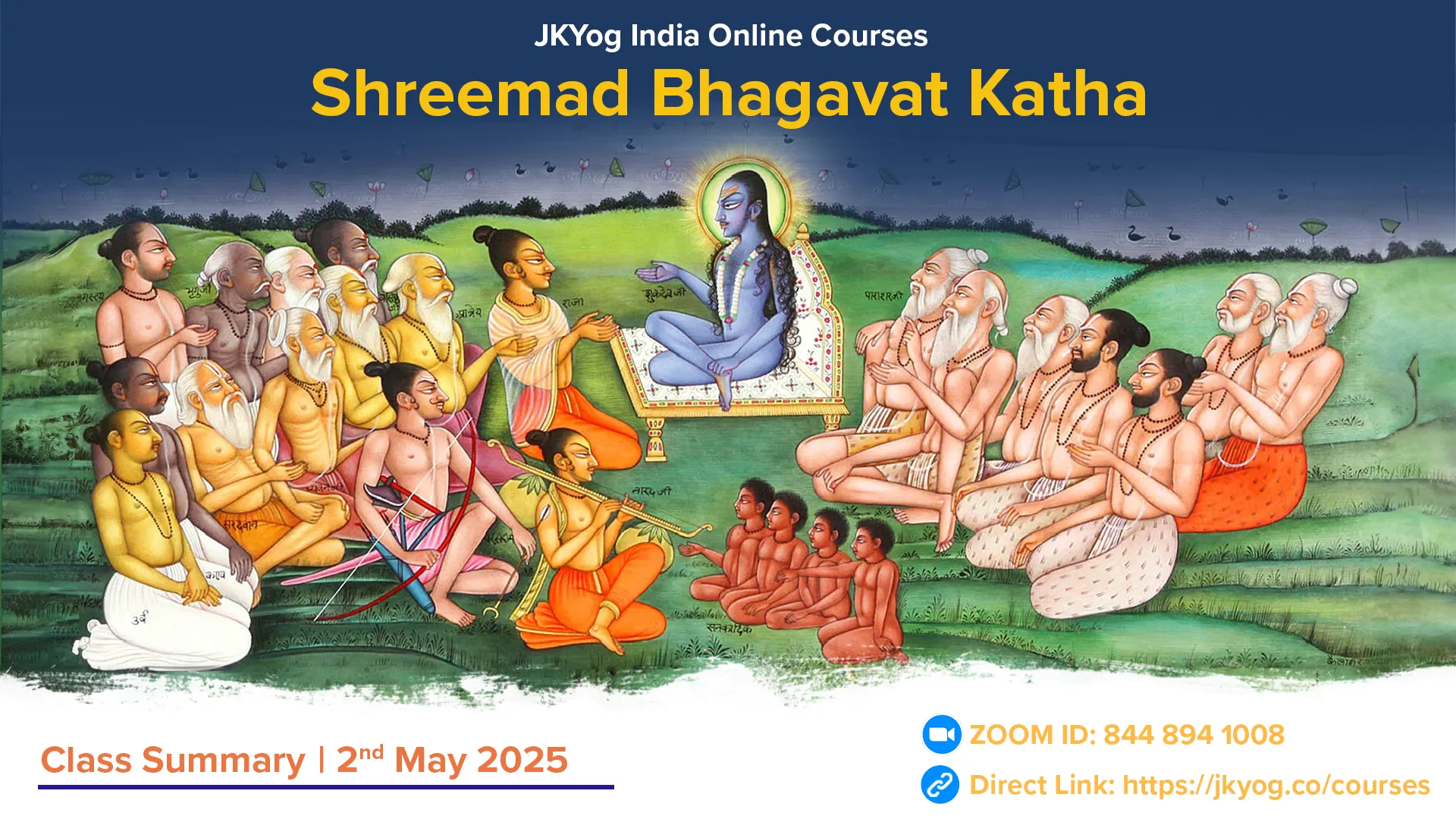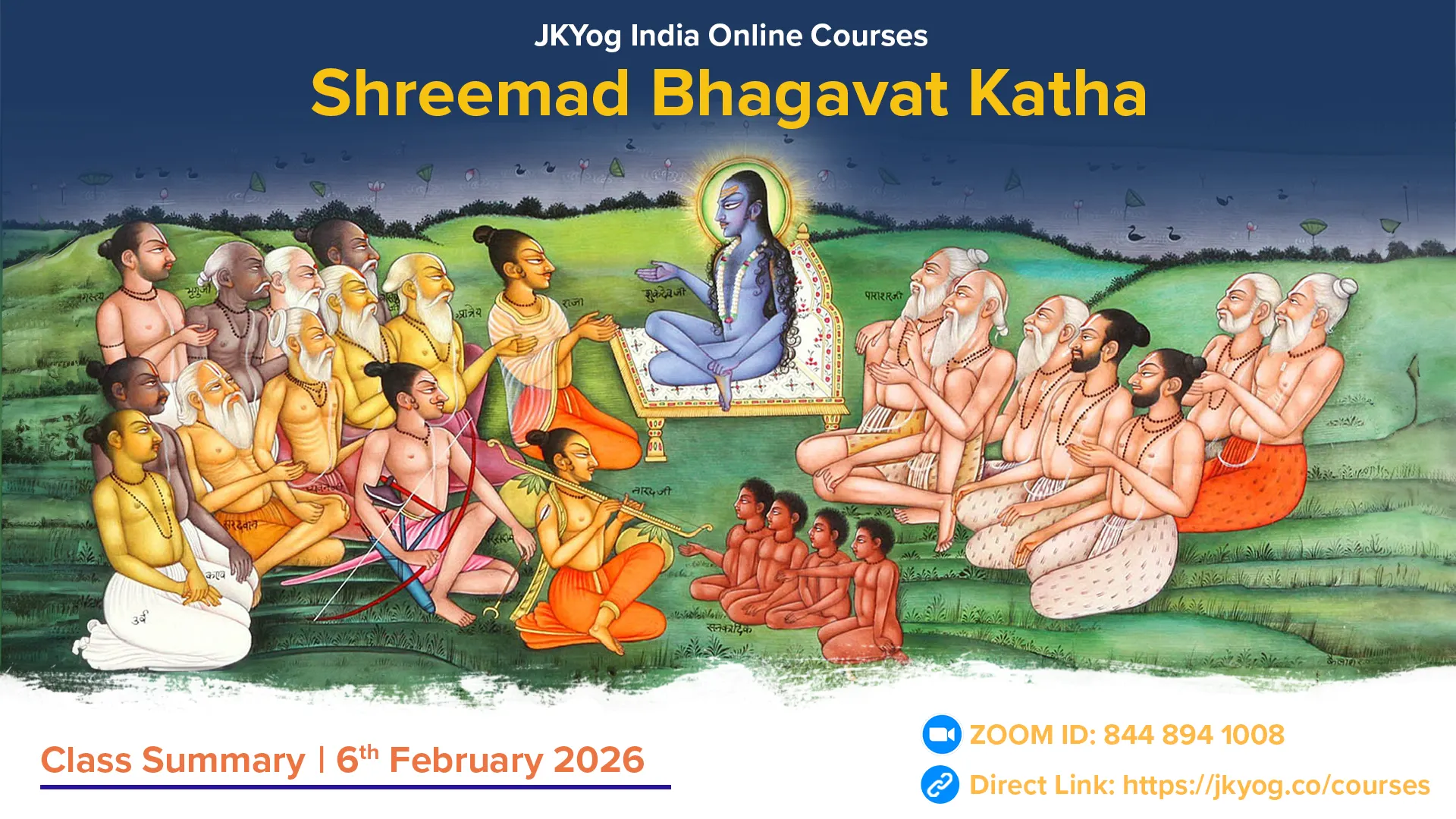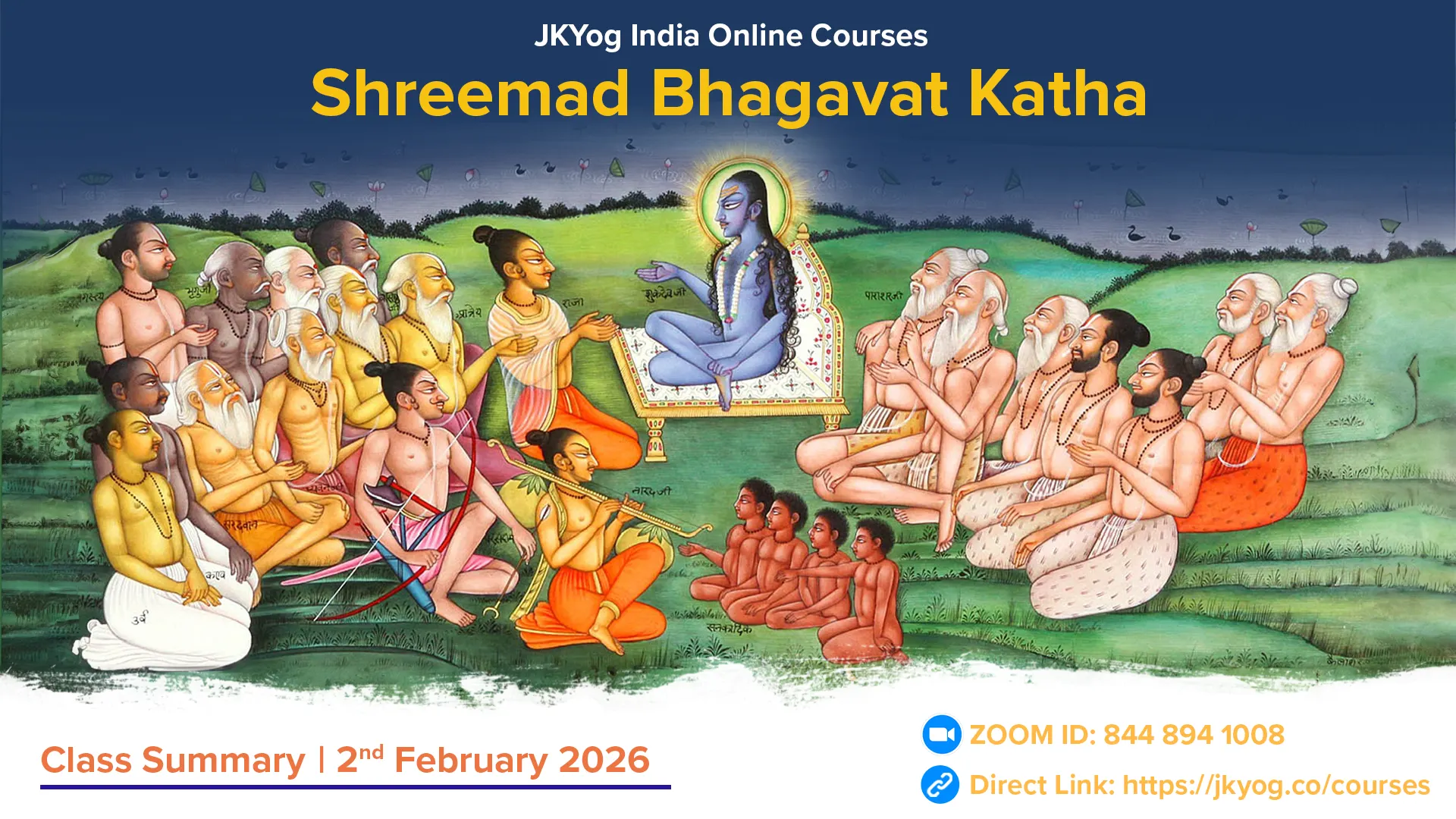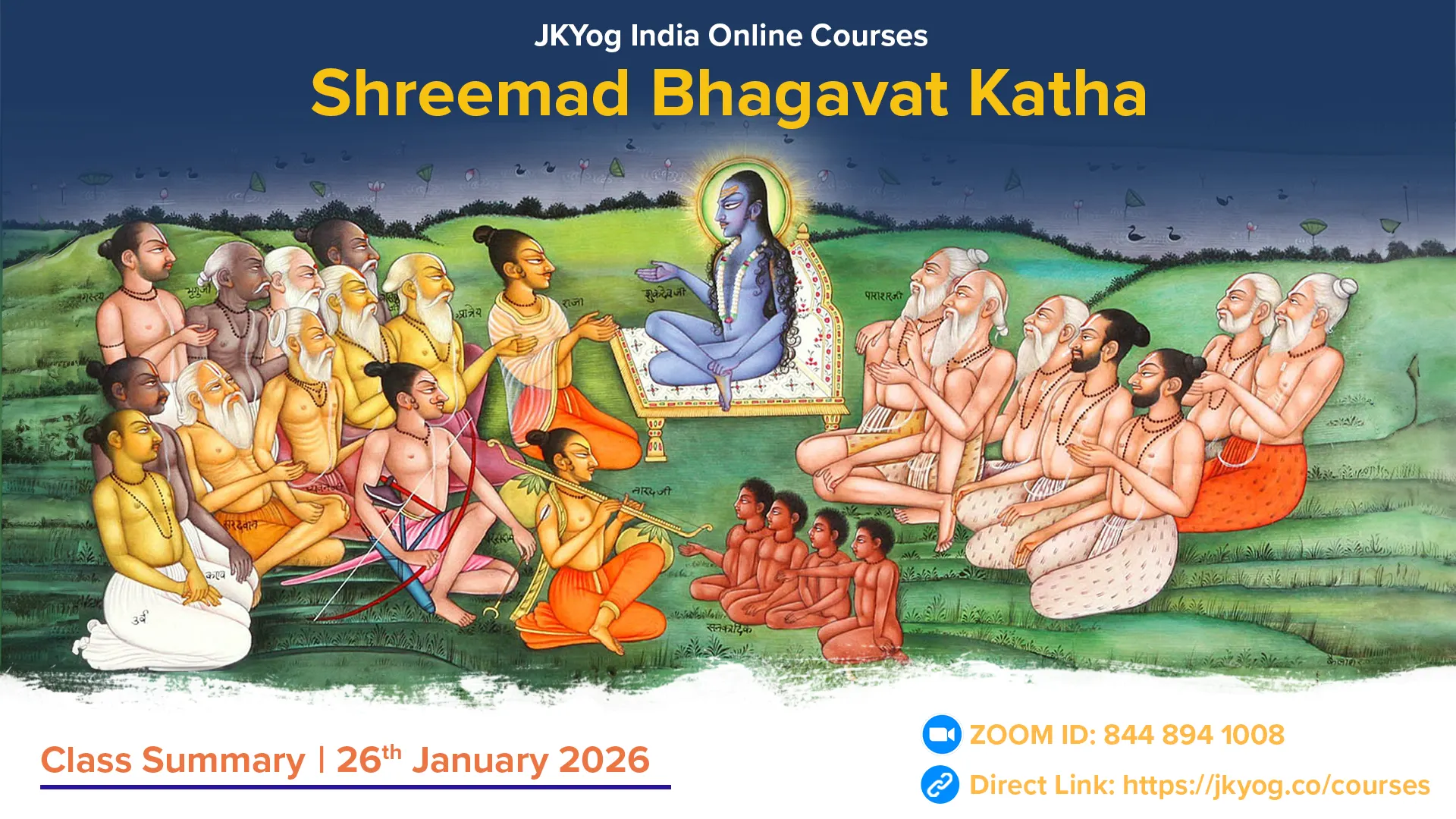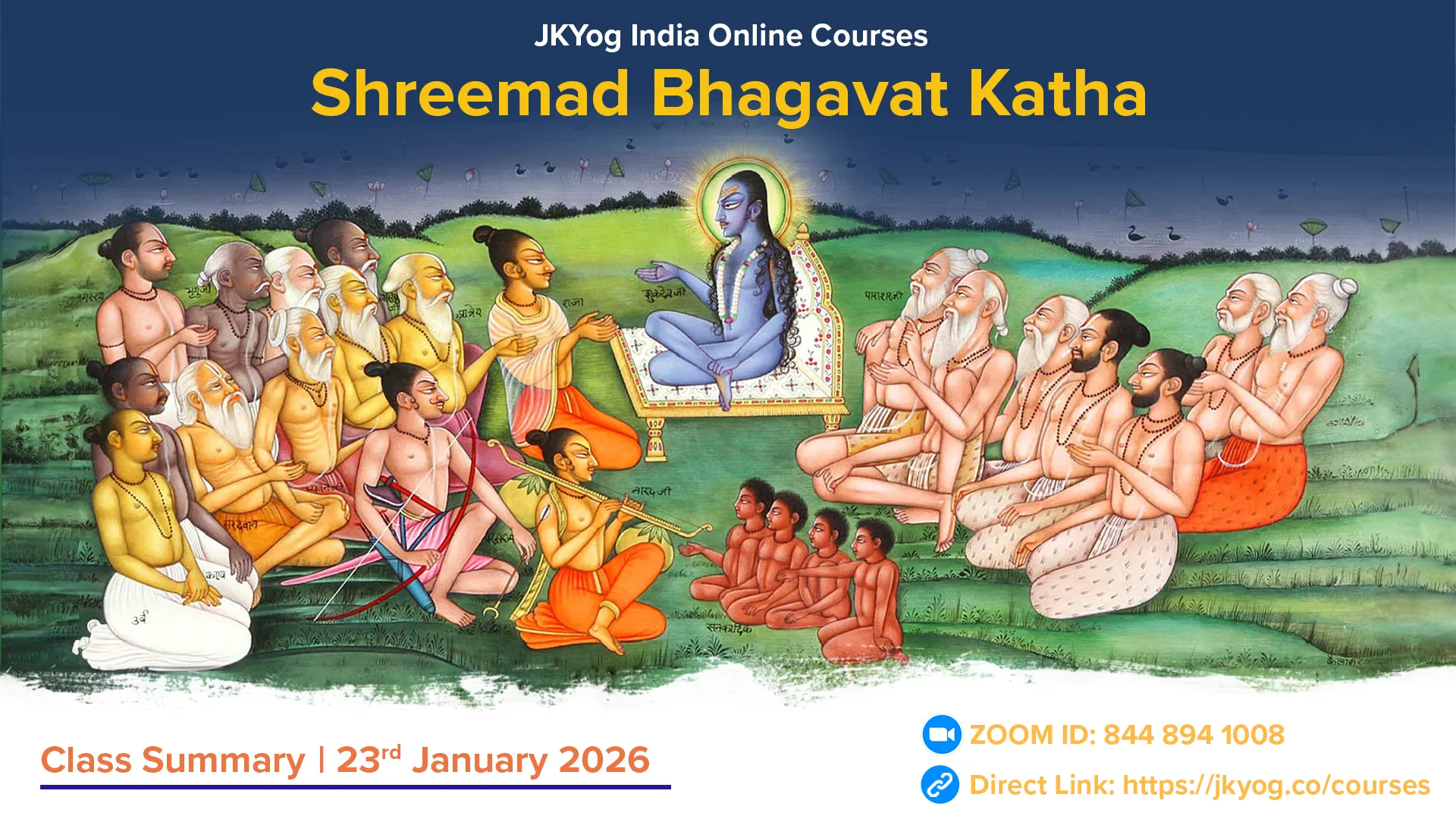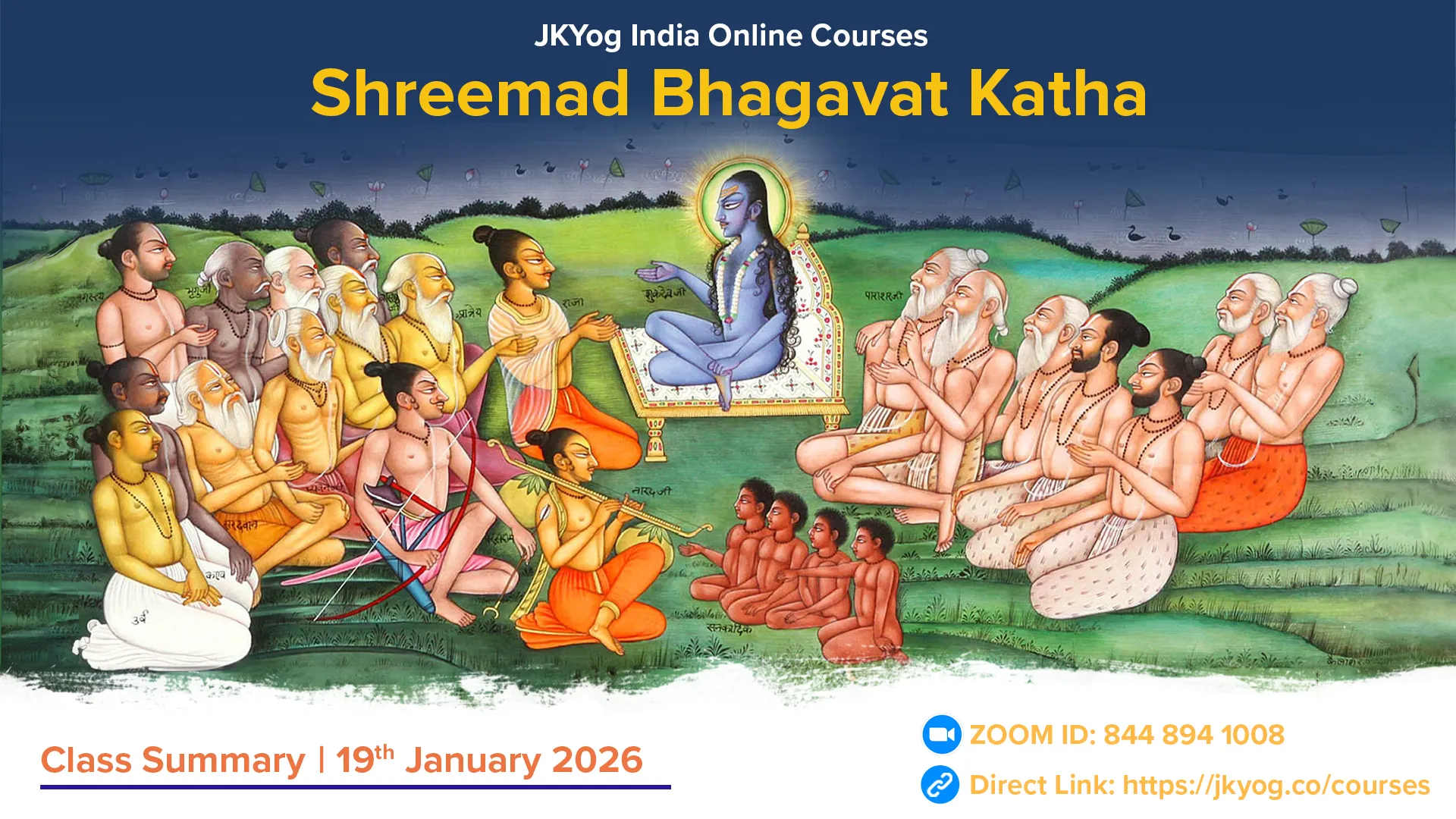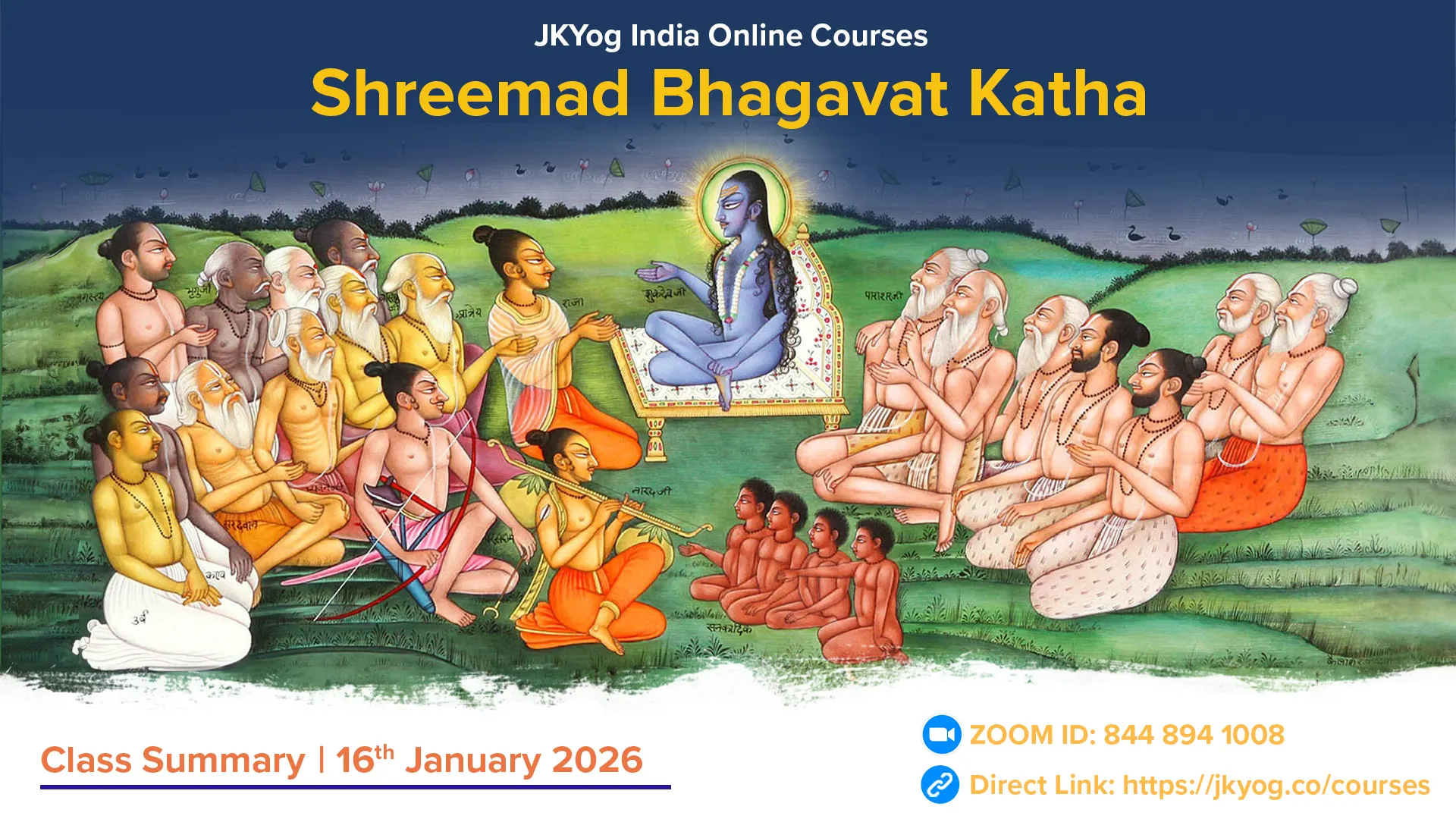Shreemad Bhagavat Mahapuran- Canto: 7, Chapters: 1-3
King Parikshit asks Shukdevji a profound question, "God is impartial, equal to all, dear to everyone, and the very embodiment of welfare. Then why does He take the side of deities like Indra and slay the daityas (demons)? When He is neither attached to the devas nor does He bear enmity towards the asuras — since He is beyond attributes and completely perfect — what is the reason for this?"
To this, Shukdevji replies, "This is a beautiful and deeply devotional question, for it contains the mystery of Bhagwan's divine play (leela) and the glory of His devotees. Great souls like Naradji sing this narrative with love, and it enhances devotion in the hearts of listeners. In truth, Bhagwan is unborn, beyond attributes (nirguna), and beyond the reach of material nature (Prakriti). However, when He performs His leela, He accepts the three gunas — sattva (goodness), rajas (passion), and tamas (ignorance) — through His own maya. These gunas do not belong to the Supreme Being but are attributes of Prakriti.
According to the dominance of these gunas:
- When sattva guna prevails, Bhagwan supports the devas and rishis.
- In rajas guna, He sides with the daityas.
- During tamas guna, He aligns with yakshas and rakshasas.
Bhagwan pervades all beings, just as fire is hidden in wood. But when He incarnates to perform divine pastimes, He adopts different modes as per maya:
- Sattva for joy and divine play,
- Rajas for creation and activity,
- Tamas for rest and dissolution.
Bhagwan is not under the control of Time — rather, Time itself is under His control. So when He increases the influence of sattva guna, it results in the welfare of the devas and the destruction of the daityas. This is not partiality but a reflection of His equal vision because He is the inner Self of all beings.
Then Shukdevji shares a fascinating incident narrated by Devarshi Naradji on the same subject. He recounts how Parikshit’s grandfather Yudhishthir, during the Rajsuya Yajna, once witnessed an extraordinary event.
King Shishupal of Chedi, who had spent his entire life blaspheming Bhagwan Krishna, suddenly got liberated and merged into Krishna in front of everyone at the yajna assembly. Yudhishthir was shocked. He wondered how Shishupal, a critic of Krishna, attained the ultimate liberation that is rare even for exclusive devotees.
Yudhishthir asked, "Shishupal and Dantavakra had hated Krishna since childhood and constantly insulted Him, yet they suffered no apparent consequences nor punishment for their sinful acts. Instead, they achieved the same supreme state that even great devotees struggle to attain. Why is that?" He also pointed out, "Once, King Vena was sent to hell by the rishis merely for defaming Bhagwan. So why this exception in the case of Shishupal?"
Pleased with these insightful questions, Naradji revealed a deep secret in front of everyone. He said that Shishupal and Dantavakra were actually the gatekeepers of Vaikunth — Jay and Vijaya — cursed by the four Kumaras (Sanak, Sanandan, Sanatan, and Sanatkumar) to take birth in the mortal world for three lifetimes.
Naradji explained that when the mind becomes absorbed in Bhagwan — whether through love, devotion, fear, hatred, desire, or affection — the soul can attain Him.
Shishupal and Dantavakra, though filled with hatred, constantly meditated on Krishna. Thus, at the end of their lives, they were liberated due to the power of that constant remembrance.
In their previous births, they were:
- Hiranyaksha and Hiranyakashipu — Bhagwan Varaha and Narasimha slayed them.
- Ravan and Kumbhakarna — Bhagwan Ram defeated them.
- Shishupal and Dantavakra — Bhagwan Shrikrishna killed them.
In each of these births, they harboured hatred toward Bhagwan, but in the end, this very hatred became the cause of their liberation.
Hiranyakashipu's Philosophical Knowledge
Yudhishthir, filled with wonder, asked, "Why did Hiranyakashipu harbour such hatred toward his devotee son, Prahlad? How did Prahlad receive Bhagwan's devotion despite being born to such a father?"
Naradji said, "Yudhishthir! When Bhagwan took the Varah (boar) incarnation and killed Hiranyaksha, his brother Hiranyakashipu became extremely enraged and distressed. He trembled with anger, ground his teeth, and gathered his army of prominent daityas and rakshasas, giving them orders.
He said that Vishnu had deceitfully killed his beloved brother, and now he would cut off Vishnu's head and perform his brother's funeral rites. He called Vishnu illusionary and partial and vowed that he would first end Vishnu, thereby causing the destruction of the gods as well. Then, Hiranyakashipu instructed his followers to go to Earth and destroy yajnas, penances, the Vedas, Dharma, and the Brahmins, for these are the foundations of Vishnu's power. Wherever there is the work of Dharma and merit, destroy it.
The daityas, in their nature, began their atrocities. They devastated towns, villages, fields, forests, ashrams, marketplaces, places of cows, and the settlements of farmers—burning them all. As a result, there was chaos on Earth, Dharma began to decline, and the gods had to leave heaven and wander in hiding on Earth.
At that time, many prominent rakshasas—such as Shakuni, Shambar, Vrik, Mahanabh, and others—came to comfort his sons and family. Hiranyakashipu, with solace, spoke to his mother, Diti, his brother's wife, Rushabhanu, and his nephews, saying, "The death of a hero is only fitting on the battlefield. Therefore, the death of Hiranyaksha is not a cause for mourning."
He then spoke about the deep philosophies of life, soul, and death. He explained:
- The soul is eternal (immortal), indestructible, pure, and all-knowing.
- It is separate from the body and mind, but due to ignorance, the soul is mistakenly identified with the body—this is the root cause of suffering.
- Just as a reflection in a flowing stream appears to be moving, the restlessness of the mind makes the soul appear restless and wandering.
- The meeting and separation of loved and unloved things, birth and death, sorrow, and attachment are all the products of ignorance (avidya)."
The Story of the Tattari Bird and Yama's Message
Then Hiranyakashipu further said, "I tell you an ancient story on this subject. The renowned and mighty King Suyajna of the Ushinar kingdom falls in battle and attains a heroic death. His body is wounded, covered in dust, and scattered with weapons. His gentle face is now distorted by death. His brothers, relatives, and soldiers gather around his body, standing in silence.
When the king's queens see this scene, they go mad with sorrow. They beat their chests and wail, saying, 'Oh Lord! You have left us. How will we live now? You were content with our service; now take us with you.' They fall at the feet of their dead husband, and their tearful cries wet his feet. The queens' mournful weeping fills the entire atmosphere with sorrow.
At that moment, Yamaraj appears in the form of a young boy. Seeing everyone's grief and foolishness, he is astonished and says, 'You are all wise, yet you grieve over death? The body of the one you call 'Suyajna' is here, but the consciousness that was there, the one that heard and spoke—his soul is no longer here. You could never see the soul, so why mourn its absence now?'
He explains that the soul is eternal, indestructible, ageless, and immortal. The body is just a clay vessel. The soul only temporarily resides in the body. Just as ornaments made of gold change shape, the soul changes bodies. He says:
- The soul, like air, resides in the body but does not cling to it.
- What is born must die, so why mourn?
- Death is merely the result of past actions (karma). No one dies too early or too late.
- Everything happens according to destiny—neither too much nor too little.
Yamaraj narrates a story: A hunter once traps a pair of Kulinga (Tattari or Indian Courser) birds. The female bird is caught in the trap, and the male bird, seeing her pain, wails, grieves, and worries about his young ones. But in the end, he, too, is killed by the hunter's arrow. With this example, Yamaraj explains, 'Foolish queens! This will be your fate, too. You do not see your own death, and yet you cry and wail for it! Even if you beat your chests in mourning for a hundred years, you will not change this fate.'
Hiranyakashipu said, 'Hearing such wise words from that little boy, everyone was stunned. The brothers and relatives of King Suyajna, as well as the queens, understood that the entire world and its joys and sorrows are transient and false. After narrating this story, Yamaraj disappeared. The brothers also performed the final rites for Suyajna. Therefore, you should not mourn for yourselves or anyone else. In this world, who is truly ours, and who is separate from us? What is ours, and what is someone else's? The attachment to what is ours and not ours is born out of ignorance. This sense of division has no other cause.'
Listening to this, Hiranyakashipu's daughter-in-law immediately abandoned her grief for her son and turned her mind towards the Supreme Divine, realising that the ultimate truth is the Supreme Soul, the Paramatma."
Hiranyakashipu's Intense Penance and the Impossible Boon of Immortality
Naradji said to Yudhishthir, "Hiranyakashipu decided that he would become the invincible, ageless, immortal, and supreme ruler of the three worlds—such that no one would be able to stand before him. With this goal, he began performing intense penance in a cave of Mount Mandarachal. Standing on his thumbs with his arms raised, gazing towards the sky, he meditated for thousands of years. His penance was so severe that the heat emanating from his body began to scorch the entire universe—rivers and seas began to boil, the Earth started to tremble, the directions began to burn, and even the heavens became unbearable.
The gods, alarmed by this, approached Brahmaji and said, 'Hiranyakashipu desires to attain the supreme position, just like you, and wants to overturn the order of Dharma. Please stop him before it's too late, or there will be great danger to all the three worlds.' Upon hearing the gods' plea, Brahmaji, along with the Prajapatis, arrived at the site of Hiranyakashipu's penance.
When they reached, they saw that Hiranyakashipu's body was covered with termites, grass, and bamboo—his skin, flesh, and blood had been devoured by ants. Yet, despite this, the heat of his penance was still tormenting the three worlds. Brahmaji himself was astonished and, smiling, said, 'My son Hiranyakashipu! Your penance has been successful. I have come to grant you a boon as you desire. Your penance is extraordinary—no one has ever done this before, nor will anyone do it in the future. You have conquered me with your penance.' Saying this, Brahmaji sprinkled his divine water from his kamandal (water pot) onto Hiranyakashipu's body. Immediately upon touching the water, Hiranyakashipu stood up as a young man—his body became powerful, his senses sharp, and his appearance radiant, like gold.
Seeing Brahmaji before him, Hiranyakashipu became extremely emotional, prostrated before him, and began to praise him with tearful words. He said, 'You are the creator, protector, and destroyer of this three-gun (three qualities) world. All knowledge, science, the Vedas, yajnas, prana (life force), the mind, and the senses have originated from you. You are the embodiment of time, the soul, and Brahman, pervading the universe in manifest and unmanifest forms. This universe has also manifested from your womb.'
yadi dasyasyabhimatan varan me varadottama
bhutebhyas tvad-visrshtebhyo mrtyur ma bhun mama prabho
nantar bahir diva naktam anyasmad api chayudhaih
na bhumau nambare mrtyur na narair na mrgair api
vyasubhir vasumadbhir va surasura-mahoragaih
apratidvandvatam yuddhe aikapatyam cha dehinam
'If you, the supreme giver of boons, desire to grant me a boon, please grant me the following: Let me not be killed by any being—whether human or animal, living or non-living, deva (god) or asura (demon), naga (serpent) or any other—created by you. Let me not die by any weapon, at any time—whether inside or outside, during the day or at night, or from any creature other than those created by you. No one shall be able to stand against me in battle. I shall become the sole ruler of all beings in the three worlds.' (Bhagavat 7.3.35-37)
sarvesham lokapalanam mahimanam yathatmanah
tapoyogaprabhavanam yan na rishyati karhichit
'Just as the glory of Indra and the other Lokapalas (world guardians) is supreme, may my glory also be the same. Give me the inexhaustible wealth that is granted to tapasvis (ascetics) and yogis.' (Bhagavat 7.3.38)
Naradji said that when Hiranyakashipu asked Brahmaji for such rare and extraordinary boons, Brahmaji, pleased with his penance, granted him those very boons. Brahmaji said: 'My son! The boons you seek are exceedingly rare for living beings, but even though they are rare, I grant you all these boons.'
Summary: JKYog India Online Class- Shreemad Bhagavat Katha [Hindi]- 02.05.2025

